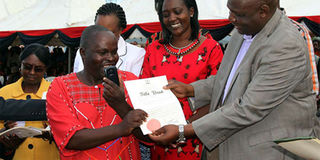Land ownership is key to better incomes for rural women

Narok County governor Samuel Tunai accompanied by Narok women representative Soipan Kudate issue a title deed to a member of Naroosura group ranch in Narok west sub county on April 28, 2016. To better incomes of rural women, land ownership is key. PHOTO | GEORGE SAYAGIE | NATION MEDIA GROUP
What you need to know:
- Important to note, rural women are intimately linked to land, their most important resource.
- The main source of restriction is the retrogressive cultural practices. They prohibit women from owning or inheriting land and other forms of property.
- Rural women’s income in developing nations can only increase if they own land, individually or jointly with joint titling only available between spouses.
The International day of Rural Women, which we celebrate today, is an annual event to recognise the role women play in agriculture and rural development.
In Kenya where the foundation of most communities is agriculture and livestock production, women contribute up to 80 per cent of workforce yet they only hold 1 per cent of registered land in their names and around 5-6 per cent of registered titles are held in joint names (Kenya Land Alliance, 2013).
Most rural people, a majority of whom are women, rarely have access to formal or legal ownership to land due to the complicated traditional beliefs, attitudes and perceptions that dictate land ownership, deeming it a preserve of male members of the society.
As a result, women are placed in a position of considerable insecurity with regards to their land rights.
KILIMANJARO INITIATIVE
In October 2016, more than 400 women across Africa participated in the Kilimanjaro initiative with an aim of creating space for rural women to be included in decision-making processes on land and natural resource.
Being the highest mountain in Africa, a charter of principle and demands on women land rights was placed at the peak of Mt Kilimanjaro to symbolise the strain of the climb and initiate a discussion across the region.
The trek is tough and certainly a test of one’s endurance.
Here, Mt Kilimanjaro presents a powerful symbol of both challenge and victory: tough to climb but the achievement and experience is not only satisfying but equally motivating and very awe inspiring!
LAND RIGHTS
So is the journey to securing women’s land tenure rights. The Initiative is an idea that was conceived by rural women supported by civil society organisations in 2012.
Important to note, rural women are intimately linked to land, their most important resource.
However, their exclusion from access, ownership and control, does not only affect their staple food production but also contribute to loss of traditional knowledge techniques that for centuries have safeguarded the integrity of the land, as well as the nutritional value of food.
Without targeted interventions through policies and laws on behalf of women’s rights to land, poverty and food security is inevitable.
PRE-REQUISITE
However, women’s land rights is a pre-requisite to fulfilling the vision of the Sustainable Development Goals that aim to end poverty and hunger, achieve food security and empower all women and girls.
While women’s rights to land and property are protected under the Kenyan Constitution, 2010 and in various national statutes, in practice, women remain disadvantaged and discriminated.
The main source of restriction is the retrogressive cultural practices. They prohibit women from owning or inheriting land and other forms of property.
Its high time Kenya confronted the deep inequalities in land and property through effective implementation of constitutional provisions to secure women land rights.
INCOME
Rural women’s income in developing nations can only increase if they own land, individually or jointly with joint titling only available between spouses.
Under joint titling, a surviving spouse is entitled to the entirety of the property.
The Land Registration Act( 2012) (Kenya), provides that on the death of a joint tenant, the deceased’s name will simply be stricken from the register once a death certificate is produced.
Property obtained during marriage for co-ownership and for use by both (or all) spouses is presumed to fall under joint tenancy, although the presumption may be rebutted with evidence that the property was intended for sole ownership.
TITLES
Through the President’s directive, more than 3 million titles are reported to have been issued nation-wide by August 2017.
The on-going titling process, specifically in the Coast region in the counties of Mombasa, Kwale, Kilifi, Lamu, Tana River and Taita Taveta, and Eastern Region in the counties of Meru and Tharaka-Nithi is expected to be up-scaled with the implementation of the Community Land Act, 2016.
Active engagement and watchdog from both communities and members of the civil society is paramount in this process.
Women should demand for an inclusive titling programme that embraces the letter and the spirit of the Constitution.
The expected outcome is that the titling programmes as ordered by the Court will encourage and promote joint titling in conformity with the Land Registration Act (2012).
Ultimately, this will be in fulfilment of the Constitution of Kenya, 2010 that expressly provides for elimination of gender discrimination in customs, law, and practices related to land and property in land ( Article 60 1, f).
The writer works with the Women Land Rights Programme under the Kenya Land Alliance (KLA) [email protected]




